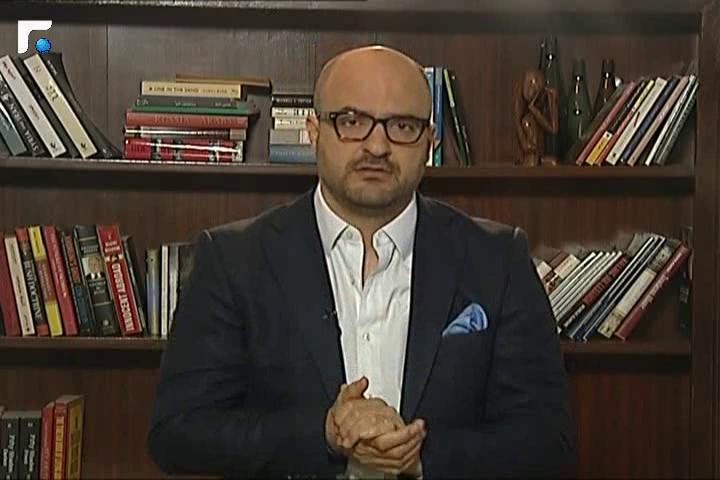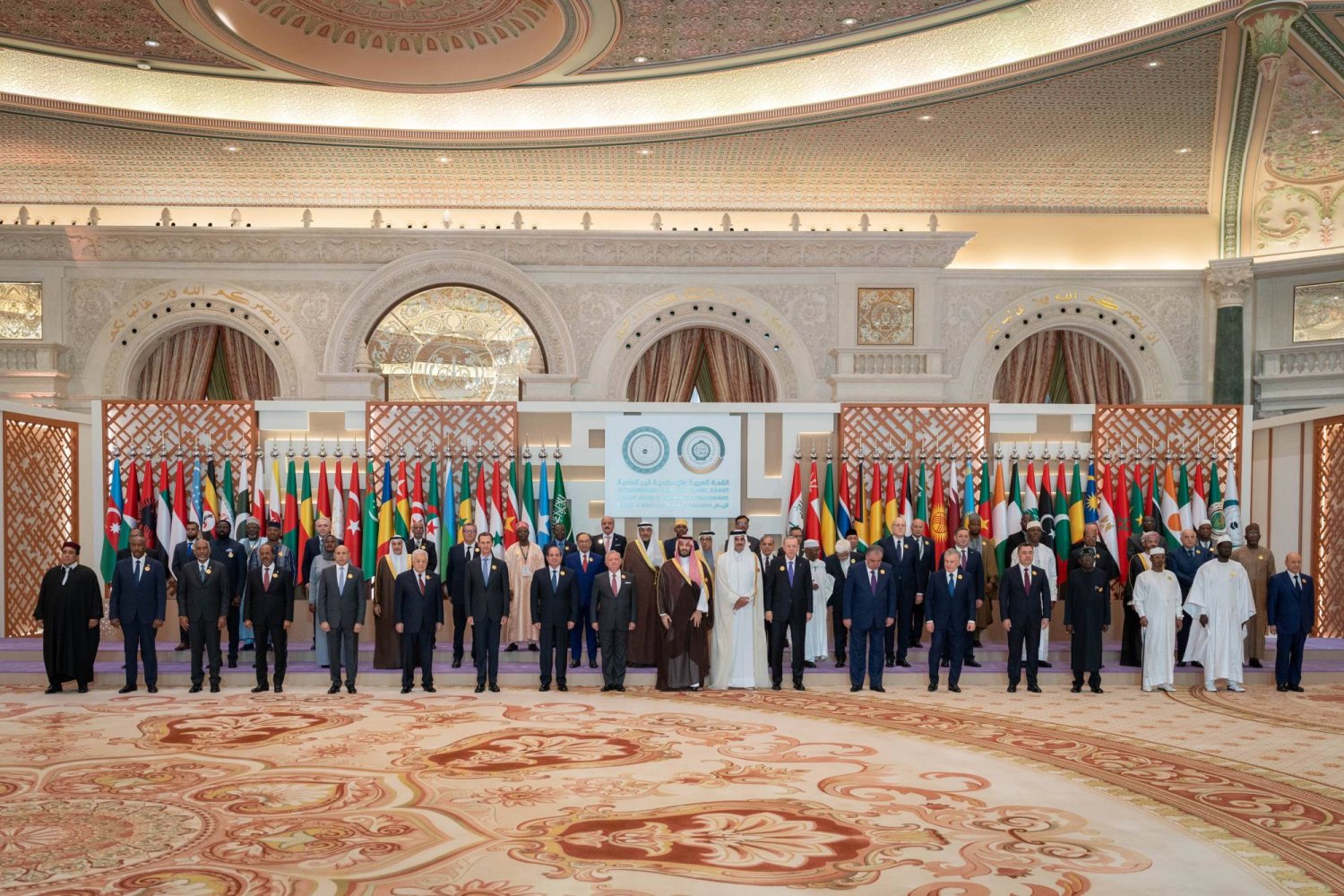زواج مصلحة بين تل أبيب وطهران
نديم قطيش/الشرق الأوسط/17 تشرين الأول/2023
The Marriage of Convenience Between Iran and Israel
Nadim Koteich/Asharq Al-Awsat/October 17/2023
Israel and Iran agree on obliterating the Palestinian national project through Gaza, and differ on everything else. Under Benjamin Netanyahu’s leadership, Israel has sought to crush the prospects of a unified Palestinian state. Meanwhile, Iran has to kill off any hope for peace in the region, and is particularly focused on undercutting the Kingdom of Saudi Arabia’s efforts to safeguard the rights of the Palestinians and put the region back on track for a comprehensive peace agreement.
The Israeli far-right has made no secret of its intent to fuel divisions between Gaza and the West Bank. Iran openly opposes the Arab-Israeli peace process, which began to encompass Gulf states in recent years, giving Iran the sense that a regional political earthquake was imminent.
Iran wants enough bloodshed in Gaza to allow it to complete its hijacking of Arab public opinion, especially in the places where Tehran believes hostility towards Israel is fading in the public consciousness. It also wants to restore its image after successive Netanyahu governments humiliated it with their assassinations and complex security operations in Tehran.
For its part, Israel wants enough bloodshed in Gaza to re-establish deterrence and create horror after being dealt a powerful and deeply psychologically jarring blow. Israel has not seen this number of Israeli civilians killed in a single day since the Holocaust, which explains the extent of the brutality of retaliation in the Strip.
Can Iran and Israel agree on a degree of bloodshed in Gaza that allows both to achieve their objectives, or will miscalculations spark total war?
Since the war began, Iran has behaved like it is involved in every detail. This is evident in the role that Iranian Foreign Minister Hossein Amir-Abdollahian has been playing. His shuttle visits and political statements make him seem like the “manager” of this rather than a regional diplomat concerned with a conflict within his country’s strategic sphere. He behaves like he decides the objectives, narrative, and terms, even going against the statements of the governments in the capitals from which he speaks, as was the case in Beirut!
Regarding the war’s expansion, Iran has sent contradictory messages. Abdollahian has said that the finger of all Resistance Axis militias is on the trigger and that a ground invasion would open new fronts, putting the “united fronts” strategy into action. However, Iran’s representative at the United Nations said that his country would not enter the war unless Iran’s direct interests were attacked.
On the other side, Israel seems interested in addressing the root causes of its recurring wars in Gaza. It does not seem to have considered engaging in a sound political process that gives the Palestinians their rights, nor hitting Iran with a blow that makes it understand that if the octopus strikes with tentacles, Israel will strike its head.
Nonetheless, no one can guarantee that developments will not leave the region slipping into a broader war although all parties are trying to avoid it.
What about the political settlement?
The dialectic relationship between war and peace has manifested itself repeatedly throughout human history. From the Peloponnesian War between Athens and Sparta to the two World Wars of the twentieth century, to the war of October 1973, the Second Gulf War, and others, we have many examples of major conflicts preluding periods of peace and stability. Indeed, wars serve as a catalyst and incentive for developing creative frameworks for governance, diplomacy, and international law.
The initial “triumphant” euphoria on Saturday and Sunday, the 7th and 8th of October, swiftly gave way to the horror that we are seeing on our screens. It became clear that instigating war cannot be a step in the right direction for the Palestinians, regardless of how desperately they need something to restore their national dignity.
On the Israeli side, the current retribution strategy has no political horizon. And the fact is that when raw force is used alone, it perpetuates the conflict and fuels cycles of violence. Without intending to, Israel will produce, through its war in Gaza, a new generation of Palestinian extremists that had been inevitably bound to take this direction before the war. It could also unintentionally lead to a reduction in the number of elites drawn to the idea of peace.
Moreover, the assumptions shattered by the war, about Israel’s security and the effectiveness of its army and intelligence, will heighten domestic tensions after this brief sense of unity brought about the national tragedy that Israelis have suffered at the hands of Hamas. Thus, without a political vision to complement its military actions, the severity of the violence could well undermine the very objectives that Israel’s military action seeks to achieve, as well as compromising Israel’s moral standing among that of the countries that have supported its right to self-defense.
If there is a silver lining in this violent escalation, it is that it reversed the fanatical course that both sides had been taking, or paved for doing so. Hamas is finished politically, and it will never be seen as a legitimate actor in any future political framework after having committed several unjustifiable crimes in a way that left it associated with ISIS, pure criminality, in the mind of the West.
Netanyahu is also finished. The myth Netanyahu had persuaded the public of, regarding his unique capacity for safeguarding security, has been removed from the Israeli collective consciousness. He will be added to the list of Israeli leaders who could not escape the guillotine of post-war accountability. Golda Meir’s political career after the 1973 war, and the same is true for Menachem Begin after the invasion of Beirut in 1982, Yitzhak Shamir after the First Intifada in the late 1980s, and Ehud Olmert after the July War of 2006.
Also, the religious fanatics, represented in government by both the National Security Minister Itamar Ben Gvir and Finance Minister Bezalel Smotrich, seem to have been totally removed from the picture, and they could well be blamed for paving the way for this explosion of violent with their provocative policies and fanning the ideological flames of the conflict.
There is an opportunity to end this war with the defeats of the extremism camps on both sides, which would revive and strengthen the peace camp in both Israel and the Arab world, allowing it to prevent the destructive outcomes that the marriage of convenience between Tel Aviv and Tehran is leading us to
زواج مصلحة بين تل أبيب وطهران
نديم قطيش/الشرق الأوسط/17 تشرين الأول/2023
تتفق إسرائيل وإيران على تدمير المشروع الوطني الفلسطيني من بوابة غزة، وتختلفان على كل ما عدا ذلك. تسعى إسرائيل، تحت قيادة بنيامين نتنياهو، إلى سحق احتمالات قيام دولة فلسطينية موحدة، في حين تهدف إيران إلى تبديد أي أمل في السلام في المنطقة، لا سيما سعي المملكة العربية السعودية لاستعادة مسار السلام الشامل الضامن لحقوق الفلسطينيين. اليمين الإسرائيلي المتطرف لم يُخفِ سعيه الدائم لتغذية الانقسام بين غزة والضفة. وإيران تعارض علناً مسارات السلام العربي – الإسرائيلي الذي بدأت حلقاته الخليجية في السنوات الأخيرة تُشعرها بأن زلزالاً سياسياً يتهيأ في المنطقة.
تريد إيران ما يكفي من الدماء في غزة لتستكمل اختطاف الرأي العام العربي، لا سيما في البيئات التي ترى طهران أن العداء لإسرائيل خرج من وعيها. وتريد ترميم صورتها في مواجهة إسرائيل بعد سيل الإهانات التي تلقتها من حكومات بنيامين نتنياهو على شكل اغتيالات وعمليات أمنية معقدة داخل طهران. تريد إسرائيل، من جهتها، ما يكفي من الدماء في غزة لإعادة تأسيس الردع والرعب بعد أقوى صفعة يتلقاها الكيان في صميم وجدانه ووعيه. لم يُقتل هذا العدد من المدنيين الإسرائيليين في يوم واحد منذ الهولوكوست، وهذا ما يفسر حجم التوحش في الرد على القطاع.
فهل من منسوب دموي مشترك في غزة يكفي لتحقيق هدفَي كلٍّ من إسرائيل وإيران، أم أن أخطاء الحسابات ستقود إلى حرب شاملة؟
منذ بداية الحرب تصرفت إيران على أنها معنية بكل تفاصيل ما يجري. ظهر ذلك جلياً في الدور الذي يلعبه وزير الخارجية الإيراني حسين أمير عبداللهيان عبر زياراته المكوكية وتصريحاته السياسية التي تبدو كأنها صادرة عن «مدير الحرب» لا عن دبلوماسي إقليمي معنيّ بنزاع يحصل ضمن المدى الاستراتيجي لبلاده. تصرف على قاعدة أنه هو من يحدد أفقها وسرديتها وشروطها، حتى خلافاً لحكومات العواصم التي يتحدث منها، كما حصل في بيروت!
وبخصوص توسع الحرب، بعثت إيران برسائل متناقضة. قال عبداللهيان إن أيدي ميليشيات المحور كلها على الزناد وإن الغزو البرّي سيقود إلى فتح جبهات أخرى ضمن استراتيجية توحيد الجبهات. أما ممثل إيران في الأمم المتحدة فقال إن بلاده لن تدخل الحرب ما لم تتعرض مصالح إيران المباشرة للاعتداء.
على الجانب الآخر، تبدو إسرائيل غير معنية حتى الآن بأكثر من معالجة ملف غزة معالجةً جذريةً من دون الذهاب باتجاه معالجة الأسباب الأصلية للحروب المتكررة، أكان ذلك يعني عملية سياسية سليمة تعطي الفلسطينيين حقوقهم أو توجيه ضربة لإيران تُفهمها أن الرد على أذرع الأخطبوط هي ضرب رأسه.
مع ذلك لا يمكن لأحد أن يضمن عدم انزلاق الأمور نحو حرب أوسع حتى وإن كانت الأطراف تسعى لتجنبها.
ماذا بخصوص التسوية السياسية؟
جدلية العلاقة بين الحرب والسلم تجلت مراراً وتكراراً طوال التاريخ البشري المديد. من الحرب البيلوبونيسية بين أثينا وإسبرطة قبل الميلاد، إلى الحربين العالميتين في القرن العشرين، مروراً بحرب 1973، ووصولاً إلى حرب الخليج الثانية وغيرها وبينها الكثير، كانت الحروب الكبرى مقدمات لفترات من الاستقرار والسلام. فالحروب محفز مهم للابتكار في ترتيب آليات الحكم، والدبلوماسية، والقانون الدولي.
نشوة «الانتصار» الأولى يومَي السبت والأحد، 7 و8 من الشهر الجاري، سرعان ما أفسحت المجال لكل هذا الرعب الذي نتابعه على الشاشات. ظهر جلياً أن الحرب لا يمكن أن تكون خطوة فلسطينية في الاتجاه الصحيح، أياً تكن حاجتهم لما يرمِّم الكرامة الوطنية. أما على الجانب الإسرائيلي، فلا أفق سياسياً لاستراتيجية الانتقام الراهنة. والحال تصير القوة العسكرية العارية سبباً لدوام الصراع ودورات العنف. من حيث لا تريد إسرائيل سينتج عبر حرب غزة جيل جديد من المتطرفين الفلسطينيين ممن لم يكن تحولهم في هذا الاتجاه مسألة حتمية قبل الحرب، دعْكَ من نزيف النخب المؤيِّدة لفكرة السلام. كما أن الافتراضات التي مزّقتها الحرب، حول أمن إسرائيل وكفاءة جيشها ومخابراتها، ستؤدي إلى تفاقم التوترات الداخلية بعد فترة توحُّد وجيزة بين الإسرائيليين بفعل المأساة التي صنعها لهم هجوم «حماس». وعليه، وفي غياب أفق سياسي للقوة العسكرية، من المرجح أن تقوّض القسوة المسلحة الأهداف ذاتها التي سعى العمل العسكري إلى تحقيقها، عدا عن تقويض السمعة الأخلاقية لإسرائيل، بين العواصم التي أيّدت حقها في الدفاع عن نفسها.
إن كان من حسنة لهذا الانفجار الدموي، فهي أنه أنهى البنى المتطرفة على جانبي الحرب أو مهّد الطريق لذلك. «حماس» انتهت سياسياً ولا يمكن أن يُقبل بها طرفاً في أي معادلة سياسية مقبلة بعد أن ارتكبت كماً من الجرائم غير المبررة وبطريقة ألصقت بها صفة «داعش» بما هي، في ذهن الغرب، كنايةً عن الإجرام الصافي. ونتنياهو انتهى، مع سقوط كل الأساطير الأمنية التي أسَّس لها في وعي الإسرائيليين. أضف إلى ذلك أن عتاة قادة إسرائيل ممن سبقوه لم ينجوا من مقصلة المحاسبة بعد الحروب. انتهت غولدا مائير سياسياً بعد حرب 1973، ومناحم بيغن بعد اجتياح بيروت 1982، وإسحاق شامير بعد الانتفاضة الأولى نهاية الثمانينات، وإيهود أولمرت بعد حرب يوليو (تموز) 2006. كما أن التيار الديني المتطرف ممثلاً في كلٍّ من وزير الأمن القومي إيتمار بن غفير، ووزير المالية بتسلئيل سموتريتش، بدا خارج المشهد تماماً، ومعرَّضاً لأن يتحمل مسؤولية تهيئة الأرضية لانفجار الأوضاع بسبب سياسات الاستفزاز وأدلجة الصراع.
ثمة فرصة لأن تنتهي الحرب بخسارة معسكر التطرف في الجهتين، وأن يقود ذلك إلى إحياء وتعزيز معسكر السلام في إسرائيل وفي العالم العربي في مواجهة الأفق المدمر الذي يقودنا إليه زواج المصلحة بين تل أبيب وطهران.





















